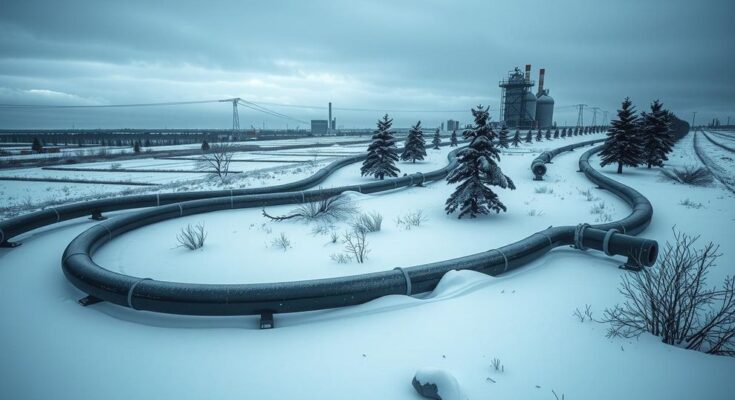Amid severe gas shortages in Iran, authorities confirm continued gas exports to Iraq, prioritizing foreign contracts despite a significant debt owed by Iraq. While Iranian citizens face hardships with gas supply disruptions, the regime maintains a focus on international energy agreements over domestic needs. The energy crisis has led to widespread implications, including the closure of government offices and schools.
In the midst of a severe winter where millions of Iranians face gas shortages, Iranian authorities have confirmed the continuity of gas exports to Iraq. Despite the significant $11 billion debt owed by Iraq for past energy purchases and the imposition of U.S. sanctions, Iran continues its energy transactions, demonstrating a clear prioritization of foreign agreements over domestic needs.
Saeed Tavakoli, CEO of the National Iranian Gas Company, recently reaffirmed Iran’s commitment to exporting gas, highlighting a newly extended long-term contract with Iraq. He dismissed concerns related to U.S. sanctions, asserting that the sanctions pertain to different gas transaction types. Iranian households, however, experience ongoing gas supply issues and power outages, with Tavakoli’s reassurances contrasting starkly with public hardships.
The Iranian government’s energy agreements with Iraq persist even as Baghdad struggles to clear its multibillion-dollar debt to Iran. Iraqi officials claim payments are lodged in accounts yet hindered by international sanctions. This situation intensifies fears of an electricity crisis in Iraq, which heavily relies on Iranian gas, as alternatives remain elusive.
Despite challenges, Iran opts to maintain its energy exports, leaving its citizens in parlous conditions. Allegations of mismanagement abound as families endure decreased heating availability. The regime claims energy stability; however, citizens experience rationing, blackouts, and a growing discontent as foreign contracts overshadow their pressing domestic energy needs.
The ongoing energy crisis has forced the closure of government offices and schools across 28 provinces in Iran, thereby exacerbating citizens’ struggles. While the populace grapples with a bitter winter and gas shortages, the regime’s focus on continuing gas exports illustrates a commitment to regional influence rather than addressing the urgent needs of its own people.
The ongoing energy crisis in Iran is characterized by severe gas shortages that affect millions during one of the coldest winters experienced in recent years. Despite possessing the world’s second-largest natural gas reserves, Iran is paradoxically in a position that necessitates gas imports due to domestic supply shortages. The Iranian government prioritizes maintaining financial agreements with Iraq, leading to widespread public frustration as citizens suffer from energy inadequacies amid freezing conditions.
In summary, the Iranian regime’s decision to continue gas exports to Iraq amidst severe domestic shortages highlights a troubling disparity in prioritizing foreign agreements over the welfare of its own populace. As citizens endure hardships, including power outages and heating crises, government assurances of energy stability appear increasingly hollow against the backdrop of ongoing difficulties faced by households. This ongoing issue underscores the critical need for a reevaluation of priorities within Iranian energy policy.
Original Source: www.ncr-iran.org




